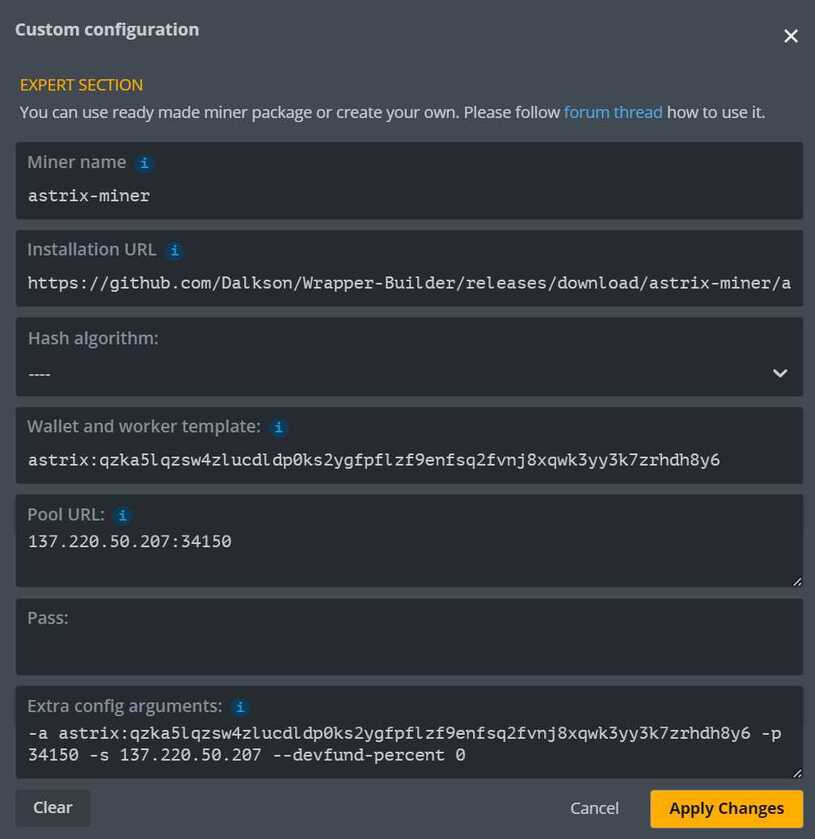This is a guide to build a wallet and node for the Xelis fork Skoof. The wallet guide is first and you can mine to the public node I have built with rigel miner now. Node Guide will be completed later.


This is a guide to build a wallet and node for the Xelis fork Skoof. The wallet guide is first and you can mine to the public node I have built with rigel miner now. Node Guide will be completed later.
Here are the files with AMD flash and instructions https://drive.google.com/file/d/1WxRBqj9QZ_hwYzBsy5kzGmhQt7cUK4SW/view?usp=sharing unpack to a dos bootable drive created with rufus and follow video. To get into bios remove all drives. I also recommend turning off silent boot.
Use my referral for Ape pro: https://ape.pro/?ref=UZOt9qW9oUOa
Phantom Wallet: https://phantom.com/
Join Locals for exclusive content https://sonofatech.locals.com/
Check out the Crypto Mining Ecourse at https://sonofatech.com
Ergo Address: 9fCyhudURbDSA2qi9k3sh1LgbHwyFwT6fck7wQW2YYWk9xR1miN
ETH Address: 0x8446b70aA05c811d7bF590e6EDE3d90C00391FcE
ETC Address: 0x8446b70aA05c811d7bF590e6EDE3d90C00391FcE
ZIL Address: zil135ajqdgf9mj6r50e8t28p98xvsss8ay7cppyx5
RVN Address: RLS9LQQg3JyjZV8p2DigMrK3S2qR8syax2
BTC Address: bc1qrk5gvvcxnvaatl9eek8pld6xs5sw0c24tgaenp
KAS Address: kaspa:qzwqvpqnxnnfy7y8zdllms68yxvh9htt74rgytn0yjlwlydwcsvjgn0cz0fz6
Flux Address: t1a276Sn6AALj6ifkgMBi8cuxa2415UajsW
LTC Address: LbNTMKfnGVoBktK1v4MtGpsoXaECRzQ1sT
XMR: 4AG3vNVkPaZ5syjKRfaHNE6CJeZ3e1g3w6pwTTZsLZXYFEpcnZtKX5TQQ6WQ2gNUQ7YVQCXP7apcvigmZvuYLgX97YLmaTa
Affiliate Links
SimpleMiningOS: https://simplemining.net/ref?user=sonofatech
Octominer: https://octominer.com/?aff=blindrun
Amazon: https://amzn.to/3bmHH2V
Coastal ...
After 10+ years in IT (mostly virtualization and infrastructure), I finally went all-in on Linux — and I’m never going back.
I actually started my career on Linux, doing database regression testing through remote servers with tools like Sahi and VNC. After years in virtualization, I took a YouTube hiatus, got back into IT as a Linux sysadmin, and decided to treat it like school again. Weeks spent in Vim taught me that “:q!” isn’t scary anymore 😅 (but yeah, I still use nano for quick stuff).
Once you go deep into Bash, PowerShell feels... slow. Everything’s just cleaner in Linux, and it grows with you instead of boxing you in.
🎬 Creative Stack
For years I was tied to Windows for Premiere Pro, GoXLR, and capture cards. Not anymore.

### My Background in Tech
I started my career doing regression testing for databases on Linux servers using tools like [Sahi](https://sahipro.com) and VNC. For three years, Linux was my daily workspace.
Later, I transitioned into virtualization — managing hypervisors, storage arrays, and entire datacenter stacks. That stretched into six years of heavy enterprise work.
Then I took a detour. I spent some time on YouTube, dabbled in crypto mining, and explored creative production. But when I returned to IT, it was as a **Linux Systems Administrator**, and that’s when everything changed.
I treated that role like going back to school. I studied Linux religiously. I spent weeks learning **Vim**, editing scripts 4 hours a night until the colon didn’t scare me anymore (though yeah, for quick edits, I still use **Nano**).
Everything just *clicked*. Unix philosophy, pipelines, scripting — it all made sense again.
***
### Why Linux Just *Feels* Better
After going deep into Bash, **PowerShell** and **Command Prompt** felt clunky. Every task on Linux — from file management to package installation — feels fluid.
I no longer `dir`; I `ls -la`. I don’t have to jump through hoops to script something or deal with registry nonsense. Shells like **Zsh** and **Fish** made my workflow almost poetic.
Once you experience that kind of precision and flow, Windows feels like driving with the parking brake on.
***
### Breaking Free from Windows
I had three major dependencies keeping me tied to Windows:
1. Creative software (Adobe Premiere Pro)
2. Hardware (Elgato capture cards, GoXLR)
3. Gaming
Let’s break those down.
***
#### 🎬 Creative Tools
For years, **Adobe Premiere** was the biggest chain holding me back — expensive, bloated, and frankly anti-consumer.
Luckily, alternatives have caught up:
- [**Kdenlive**](https://kdenlive.org/en/) now supports **NVENC** and **QuickSync** acceleration for smooth playback.
- [**DaVinci Resolve**](https://www.blackmagicdesign.com/products/davinciresolve) runs beautifully on modern Linux systems.
- There’s even a **Premiere-like UI theme** for Kdenlive that makes it trivial to switch.
Advances in hardware encoding (AV1, NVENC, and AMD’s VCE) mean timeline playback on open-source editors is now buttery smooth.
And if you use AI-assisted tools for captioning or upscaling, solutions like [**Stable Diffusion**](https://stability.ai), [**Whisper**](https://github.com/openai/whisper), and [**ComfyUI**](https://github.com/comfyanonymous/ComfyUI) run *faster* natively on Linux.
***
#### 🎙️ Audio and Capture Devices
Capture cards have leveled up. **UVC (USB Video Class)** has become the universal standard, meaning most USB capture devices just *work*. No drivers. No installers.
My **GoXLR** is now fully supported thanks to open-source kernel drivers built directly into modern Linux kernels.
The community even created a full-featured [**GoXLR Web App**](https://github.com/GoXLR-on-Linux) — a browser control panel with GUI sliders, profile import, and channel routing identical to Windows.
That one project alone made my entire stream setup functional again.
***
### 🎮 Gaming on Linux – The Turning Point
Gaming used to be the dealbreaker — until **Valve** dropped the [**Steam Deck**](https://store.steampowered.com/steamdeck) in 2022.
That single device forced the Linux gaming ecosystem to mature overnight. Out of necessity, Valve fueled the development of a game-changer:
- [**Proton**](https://github.com/ValveSoftware/Proton) (a compatibility layer built on Wine)
- **Gamescope** for performance scaling
- The **Vulkan** graphics API
Developers don’t even need to build native Linux binaries anymore — Proton translates Windows binaries seamlessly.
Sure, kernel-level anti-cheat games remain an issue (and probably always will), but that’s more of an *ethics* decision at this point. If a game requires kernel hooks, it doesn’t deserve my system access.
The wild part?
I’ve had better **day-one performance** on Linux for titles like *Monster Hunter Wilds*, *Alan Wake 2*, and *The Callisto Protocol* than on Windows.
And when a game doesn’t work right away, I head to [**ProtonDB**](https://www.protondb.com) — which lists user-tested configurations and flags for tweaking games. 99% of the time, a quick Steam launch option solves it.
Secure Boot dual-booting also works great now, as most distros (like Fedora or Garuda) let you import boot keys during install.
***
### My Distros and Setup
Currently, I run:
- 🧠 **Garuda Linux** *(Arch-based)* for daily work — custom kernels, performance tuning, and full control.
- 🎮 **Bazzite OS** *(Fedora immutable distro)* for gaming — stable, seamless updates, AppImage management, and a built-in [**Bazaar Store**](https://bazzite.gg).
For most gamers switching over, **Bazzite** or **Nobara** are perfect.
For those who love control, Garuda or Arch variants are paradise.
Flatpaks and AppImages have made software management cleaner than ever, and the isolation means even heavy users can’t “break” their systems easily.
***
### Modern Linux (2025)
In 2025, Linux finally *feels* unified.
- **Wayland** now offers smooth rendering, better HDR, and perfect multi-monitor support.
- **PipeWire** has completely overhauled Linux audio — no more Jack/PulseAudio nightmares.
- **OBS Studio** runs natively with full encoder support.
- And AI tools like [**Ollama**](https://ollama.com) make running large language models locally effortless.
The open-source community fixed everything I used to complain about — and then went further.
***
### Final Thoughts
I’ve been *100% Linux* across all devices for over a month now, and I haven’t missed Windows even once.
Everything is faster.
More open.
And completely under my control.
The community is thriving, security is transparent, and creativity is no longer gated by closed ecosystems.
What used to feel impossible is now second nature.
**Linux isn’t the alternative anymore — it’s the upgrade.** 🐧💪
***
## About the Author
I'm the host of [Son of a Tech](https://www.youtube.com/@SonofaTech), a YouTube channel focused on open-source, hardware, Linux, and the future of decentralized technology.
Whether you’re into mining, gaming, or just building better systems, you’re welcome in the community.
***
## Recommended Distros \& Resources
- [Garuda Linux](https://garudalinux.org) (great for customization \& performance)
- [Bazzite OS](https://bazzite.gg) (immutable, plug-and-play gaming)
- [Nobara Project](https://nobaraproject.org/) (Fedora-based, pre-tuned for gaming/creators)
- [ProtonDB](https://protondb.com) (crowdsourced Linux gaming support)
- [Level1Techs Forums](https://forum.level1techs.com/) (active Linux support community)
***
*Questions, feedback, or your own Linux journey? Drop a reply below or reach out on [YouTube](https://www.youtube.com/@SonofaTech) — I’d love to hear your story!*
<span style="display:none">[^1]</span>
<div align="center">⁂</div>
[^1]: https://www.youtube.com/@SonofaTech

Quick guide to spin up a node and create a wallet for EVOAI on Ubuntu 24.04
sudo su
screen -S evoaid
unzip linux.zip
cd linux
chmod +x evoaid
./evoaid
screen -S evocli
cd /root/linux
chmod +x evoai-cli
./evoai-cli getnewaddress
./evoai-cli dumpwallet evoaidata.txt
cat evoaidata | more
SAVE KEY in SAFE LOCATION

Thanks to @ScarTalon for finding this one.
Resources
Node: https://github.com/astrix-network/astrix-node
Miner: https://github.com/paragone/astrix-miner
-Website: https://astrix-network.com
-Explorer: https://explorer.astrix-network.com
-WebWallet: https://wallet.astrix-network.com
-Discord: https://discord.com/invite/cwfDZJ9dHx
-Telegram: https://t.me/astrix_network
-X: https://x.com/astrix_network
-Github: https://github.com/astrix-network
unzip astrix-node-v0.14.1-linux.zip
screen -S astrixd
cd astrix-node
./astrixd --utxoindex --rpclisten-borsh=default --rpclisten=0.0.0.0:34150
cd astrix-node
./astrix-wallet
connect 127.0.0.1
wallet create
https://github.com/Dalkson/Wrapper-Builder/releases/download/astrix-miner/astrix-miner-v0.2.1.tar.gz
